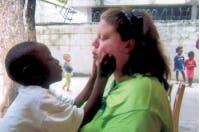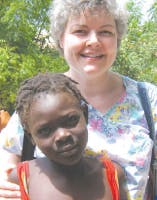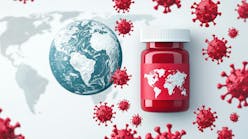Letters to the editor
Readers respond
Consult ASCP for volunteer info
I have not been abroad lately, but I went to Belize
in August to investigate the possibility of a student-exchange program.
Also, I am a consultant with ASCP which has a PEPFAR project ongoing,
and there are several colleagues that go out short term for that. There
was a recent article about this in ASCP's Lab Medicine; check out
the webpage at www.ascp.org.
—Jeanne Isabel, MSEd, CLSpH(NCA)
Program Director
and Associate Professor
Clinical Laboratory Science
Northern Illinois University
DeKalb, IL
Scout out volunteers on “Net”
The clinic that I am associated with in Haiti is the
Halos Medical Clinic; contact
[email protected]
Also, the Internet is loaded with contact information
for other volunteer clinics all over the world.
—Colleen K. Gannon, MT(AMT) HEW
MidMichigan Medical Center
Midland, MI
Where to volunteer
In response to Lisa Lister's question in the
September 2008 MLO “Letters to the editor,” page 8, here is
information on volunteering in medical missions. I have been to Haiti
nine times with a local mission organization, Allegany Region Missions
(ARM), for which I am also the secretary for the board of directors.
When I go to Haiti, I serve on the mobile medical team. When we are out
in the rural villages, the need for laboratory tests for diagnosis is
limited to urine testing and pregnancy tests. Most diagnoses are based
on the clinical picture and symptoms, and if the patient says he has
worms because he has seen them, we do not have to prove it!
There is a medical clinic run by a missionary organization, Christian Service International (CSI) based in
Muncie, IN, to which we can refer patients should they need additional
diagnosis or long-term care. My job on a mobile med team has been varied
over the years, and allows me to use a wide range of my MT knowledge and
experiences. I have worked as a pharmacy assistant and have triaged
patients. These experiences have been a blessing beyond measure.
ARM works with other organizations that already have
missionaries in-country. ARM has worked with CSI in Haiti and
Pennsylvania's TEAMS for Medical Missions in Jamaica.
1) For those interested in joining a team with a team
leader looking to fill positions, contact ARM or go to ARM's website for
a listing of upcoming trips:
Allegany Region Missions
P.O. Box 294
Randolph, NY 14772
Phone: 716-358-9126
E-mail: [email protected]
Website: www.ARMissions.org
2) For those interested in putting together a mission
team, contact: CSI Ministries
1714 Royale Drive
Muncie, IN 47304-2240
Phone: 800-286-5773
E-mail: [email protected]
Website: www.csiministries.org
TEAMS for Medical Missions
P.O. Box 215
Macungie, PA 18062
Phone: 610-398-0070
Website: www.t4mm.org
— Michele G. Harms, MS, MT(ASCP)
Program Director
School of Medical Technology
WCA Hospital
Jamestown, NY
Editor's note:
We are still compiling information for volunteer service. If other
readers have details about other programs, please share them with us.
See this month's “From the editor” for the names of other MLO
contributors who have done or still do volunteer service.
“Kaizen” but never do “Kaizan”
I read with interest “Kaizen — LEAN in a week” by
Gitte Wennecke in the August issue (page 28). Kaizen is the way where
all laboratory personnel participate to enhance laboratory operations. I
am sorry to tell you that I found a misprint of “Kaizan” in a subtitle,
but I am grateful because this gave me an insight. Originally, Kaizen
was a technical term in the Toyota production system, which was
developed during the 1950s through 1970s. It is believed that the system
has allowed Toyota to become a leading company in the automotive
industry. At Toyota, all line personnel are expected to participate in
Kaizen to enhance productivity and improve the work environment.
In contrast, “Kaizan” is an antithetical word to
Kaizen. “Kaizan” is Japanese for “falsification” or “manipulation.” I
find that sometimes “Kaizan” is wrongly used for Kaizen. These two words
have very similar pronunciations, but their meanings are completely
different (they share the original kanji character for “Kai”). Excessive
Kaizen may sometimes adversely result in an overcommitment and may
become a hotbed of “Kaizan” in order to meet job quotas and deadlines.
There is another story about Kaizen. At Toyota,
Kaizen events have been facilitated during overtime hours. However, such
events were regarded as employees' voluntary activities, and the company
did not pay any compensation until recently, according to the Asahi
Shimbun, a leading Japanese newspaper, on June 21, 2008. Some of the
employees spend their weekends and holidays to make preparations for
Kaizen events.
I just wrote down about Kaizen from another point of
view. However, if a lab manager properly facilitates Kaizen events,
Kaizen will not only be a powerful tool for laboratory operations, but
it will help all lab personnel to become more confident and responsible.
I would like to suggest that Kaizen should be pronounced as “Kaiz'en” and
should not be confused with “Kaizan.”
—Eijun Itakura, MD, PhD
Staff Research Associate
Department of Pathology
and Laboratory Medicine
David Geffen School of Medicine at UCLA
Los Angeles, CA
Editor's note:
Who knew that a misspelling could lead to such an interesting insight.
Thank you, Dr. Itakura, for a lesson that will surely be of interest for
our many readers — and our staff, too.








